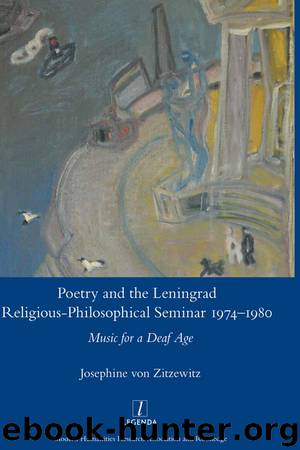Poetry and the Leningrad Religious-Philosophical Seminar 1974-1980 Music for a Deaf Age: Poetry and the Leningrad Religious-Philosophical Seminar 1974-1980 Music for a Deaf Age by von Zitzewitz Josephine

Author:von Zitzewitz, Josephine
Language: eng
Format: epub
ISBN: 9781317198512
Publisher: Taylor & Francis Ltd
Elena Shvarts
Used by permission of Kirill Kozyrev
CHAPTER 4
❖
Elena Shvarts: Incarnation Inverted
Introduction
Elena Shvarts (1948–2010) maintained close personal friendships with numerous unofficial artists and writers, including Tat’iana Goricheva and Viktor Krivulin, and her poetry was published in all the ‘mainstream’ samizdat journals. She was not an active participant in the Religious-Philosophical Seminar, yet her poetry shares key features with that of the other poets under study here. It is impossible to omit Shvarts from any discussion of ‘religious’ or ‘metaphysical’ poetry in 1970s Leningrad. As Catriona Kelly observed, Shvarts is a poet who ‘exploited her generation’s drive to transcendence with particular success’.1
Shvarts’s itinerary before 1989 is typical of her generation. The daughter of the theatre expert Dina Shvarts, Elena grew up immersed in literature, began writing poetry as a teenager, and was soon part of the vibrant semi-official literary scene of the 1960s, participating in various LITOs and other activities for young poets. Her formal education was patchy: she left Leningrad State University without a degree and completed a distance learning course at the Theatre Institute. Translating plays provided her with a modest income, and Shvarts could devote herself entirely to her writing.2 As a serious poet whose talent was widely recognized among her peers, Shvarts was one of the few women in an almost exclusively male bastion.3 Her lifestyle was bohemian: she drank and smoked heavily, failed to turn up for readings, and was known among her friends for her proclivity for ‘скандал и рукоприкладство’ [‘scandals and blows’].4 Her own account of these episodes, related in stylized fashion that makes them seem like diary entries, are collected in two prose works, Vidimaia storona zhizni (1997) and Opredelenie v durnuiu pogodu (2003). Despite her aversion for public readings she founded her own literary group, called Shimpozium, a ‘monkey order’ where all guests had monkey-related nicknames.5 During the Soviet years, her publication opportunities were limited to samizdat6 and tamizdat, publication outside the Soviet Union.7 But unlike most of her peers, Shvarts went on to enjoy a successful career after the fall of the Soviet Union, publishing a substantial number of new collections.8 Moreover, she made a name for herself on the international stage, attracting the attention of scholars,9 and to date she is the only one among the poets considered in this study to have had several collections translated into English.10
Unlike some of the poets under study here, she seems not to have been tempted to experiment with institutional religion and the Orthodox Church, yet the religious quest in her writing is potentially even more pronounced than in the case of her peers.11 Shvarts was of Jewish background, and her interest in Christian motifs, and Christianity itself, places her in line with many well-known figures of Jewish heritage who felt a similar attraction, such as Osip Mandel’stham, Lev Shestov, Boris Pasternak, and in her own age, Iosif Brodsky, Lev Losev, and the artist Mikhail Shvartsman. As we shall see in this chapter, Shvarts’s poetry had a clear devotional focus, something that the poet
Download
This site does not store any files on its server. We only index and link to content provided by other sites. Please contact the content providers to delete copyright contents if any and email us, we'll remove relevant links or contents immediately.
4 3 2 1: A Novel by Paul Auster(12377)
The handmaid's tale by Margaret Atwood(7757)
Giovanni's Room by James Baldwin(7332)
Asking the Right Questions: A Guide to Critical Thinking by M. Neil Browne & Stuart M. Keeley(5764)
Big Magic: Creative Living Beyond Fear by Elizabeth Gilbert(5757)
Ego Is the Enemy by Ryan Holiday(5418)
The Body: A Guide for Occupants by Bill Bryson(5082)
On Writing A Memoir of the Craft by Stephen King(4937)
Ken Follett - World without end by Ken Follett(4724)
Adulting by Kelly Williams Brown(4567)
Bluets by Maggie Nelson(4548)
Eat That Frog! by Brian Tracy(4526)
Guilty Pleasures by Laurell K Hamilton(4442)
The Poetry of Pablo Neruda by Pablo Neruda(4098)
Alive: The Story of the Andes Survivors by Piers Paul Read(4023)
White Noise - A Novel by Don DeLillo(4006)
Fingerprints of the Gods by Graham Hancock(3999)
The Book of Joy by Dalai Lama(3977)
The Bookshop by Penelope Fitzgerald(3844)
